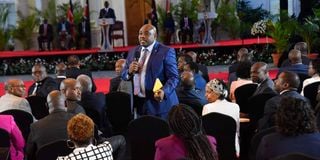Parents’ pain in university funding plan

Higher Education Loans Board CEO Charles Ringera answers a question at State House in Nairobi on May 3, 2023 during a press conference on university education funding.
The new funding formula for universities and technical and vocational education and training (Tvet) institutions unveiled by President William Ruto on Wednesday will see households pay more for higher education contrary to assertions that it does not raise the fees.
While the President said that all students will receive state funding, calculations based on the cost of university programmes as per the Universities Fund data indicate that households will carry a heavier burden than before.
The President announced four categories under which students will be funded: vulnerable, extremely needy, needy and less needy. The automatic 80 per cent of unit cost every government-sponsored student would benefit from was also removed and help will now be based on a student’s family background.
The vulnerable and extremely needy students, whom the President said account for 29 per cent of the 2023 cohort, will fully be funded through government scholarships, loans and bursaries. Those in the needy and less needy categories are likely to complete their studies with bigger loans from the Higher Education Loans Board (Helb) than currently happens as they will get less in terms of government scholarship.

“Students whose households are at the bottom of the pyramid shall enjoy equal opportunity in accessing university and Tvet education. Their households shall not make any contribution towards the education of their children,” the President said.
Family kitty
Students admitted to expensive courses will pay more from the family kitty than those in less expensive programmes. A bachelor’s degree in dentistry is the most expensive at Sh720,000 while the cheapest is a bachelor of arts degree at Sh144,000.
“What would happen if my son doesn’t get the maximum set amount for scholarship and loan? It means I’ll have to pay more,” a parent with a son joining university this year said.
Helb Chief Executive Charles Ringera said that a means testing instrument will be used to determine the economic status of students. He added that the information students give will be verified by local leaders and that Helb will mine information on household earnings from the Kenya Revenue Authority and the Registrar of Persons.
While appearing before the Public Investments Committee on Education and Governance, Education Cabinet Secretary Ezekiel Machogu yesterday said the state will fund all the qualified students in public universities. Those who go to private ones will not be eligible for government scholarships but can apply for Helb loans.





